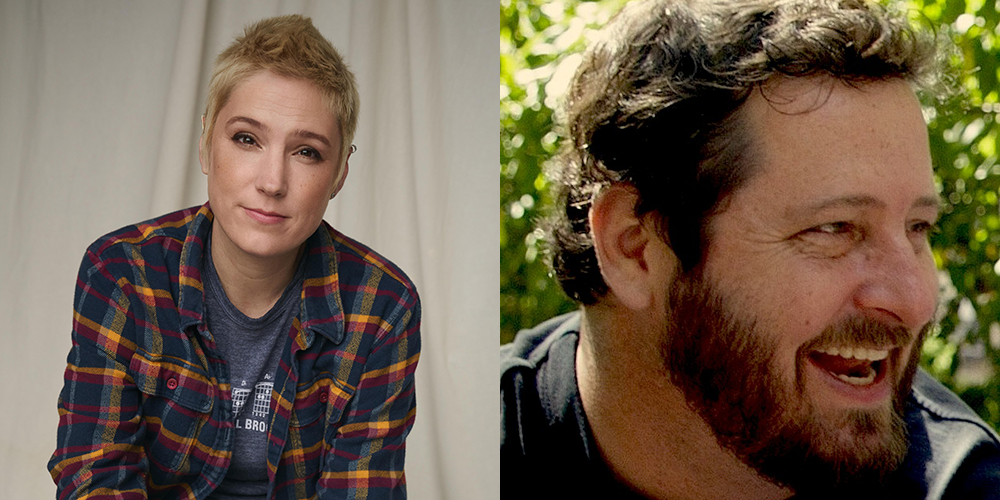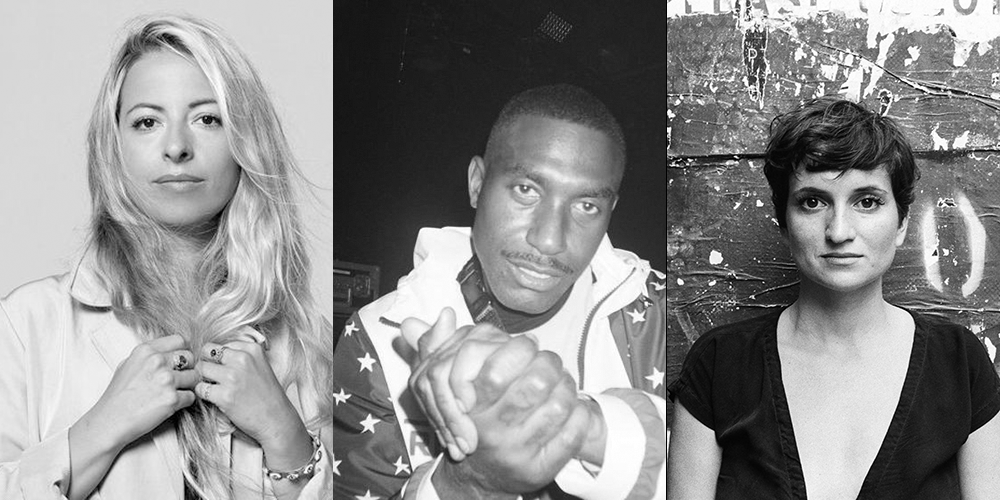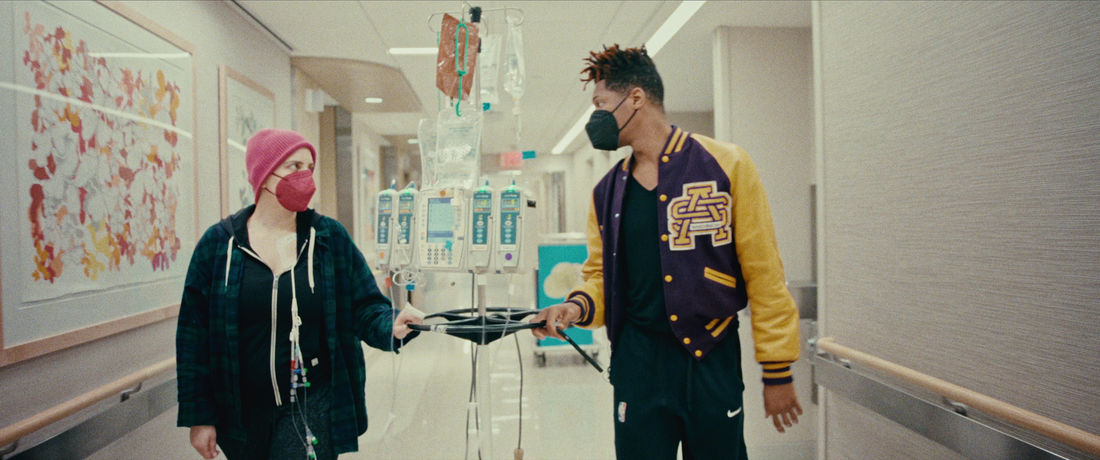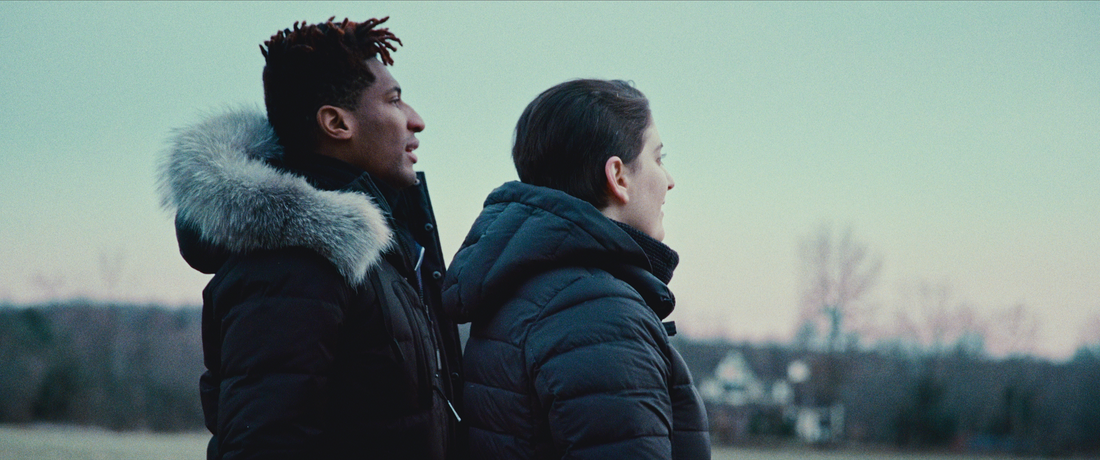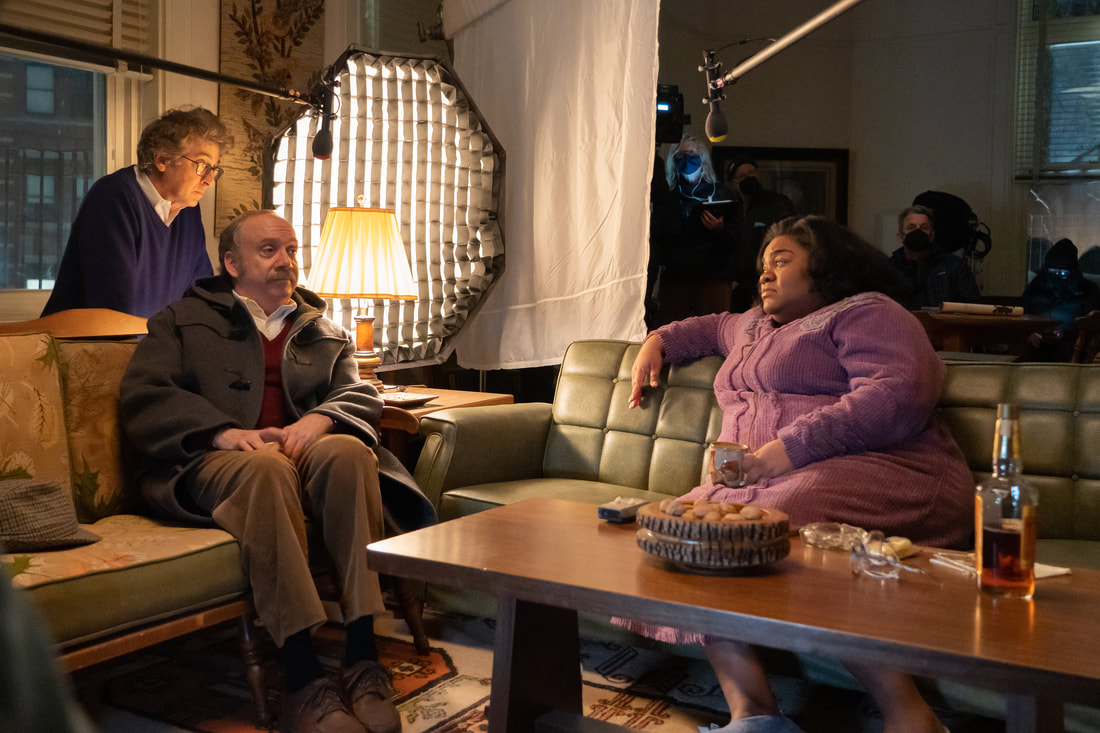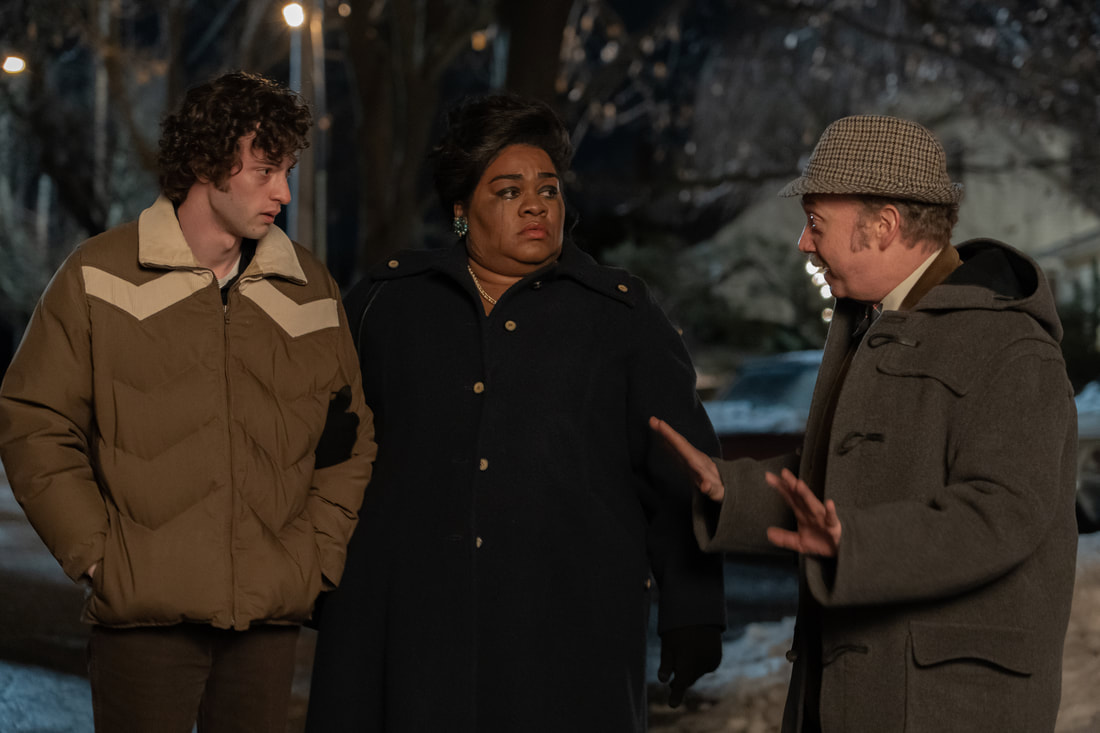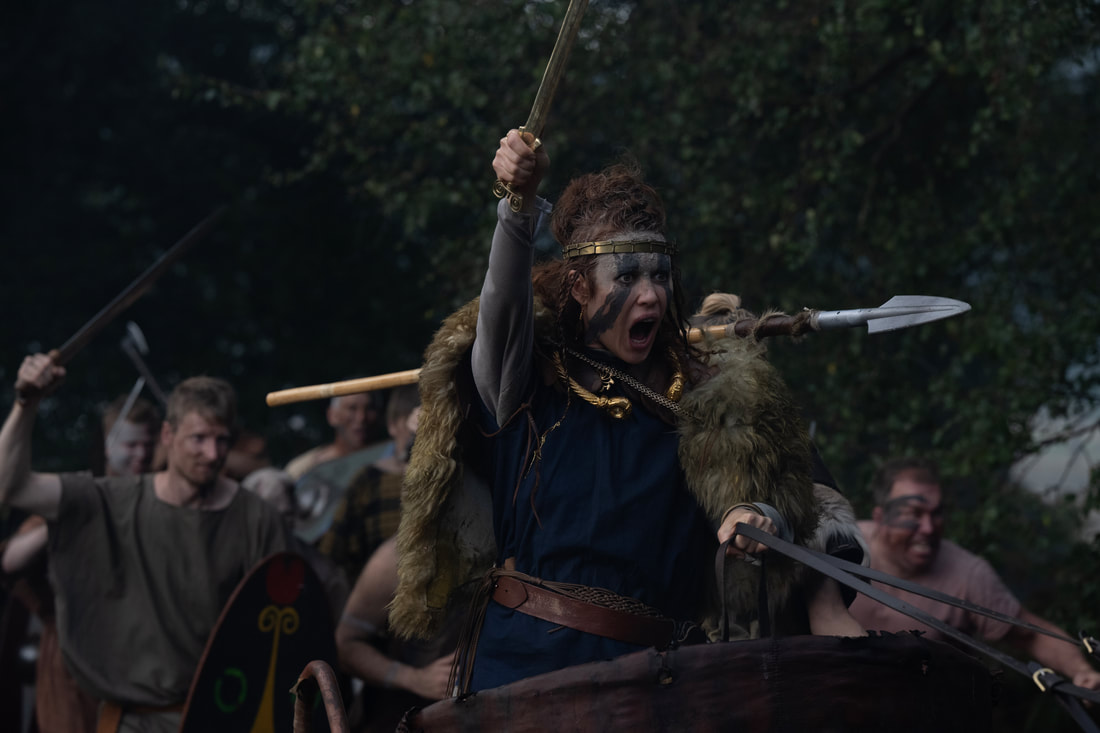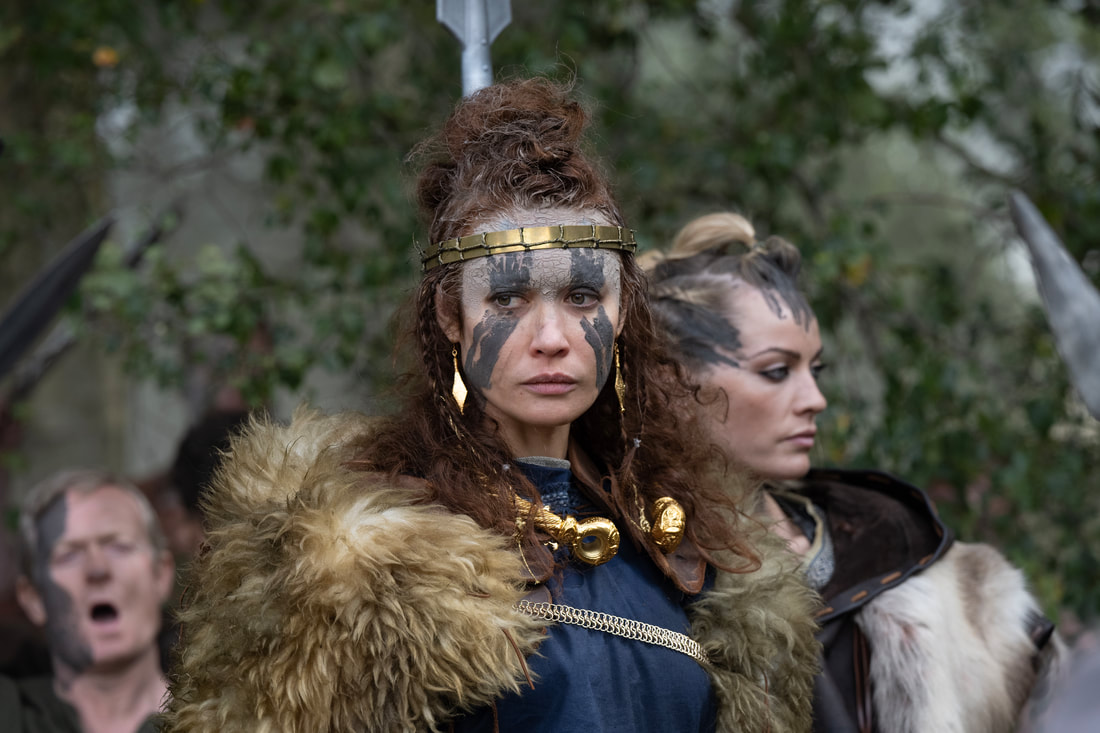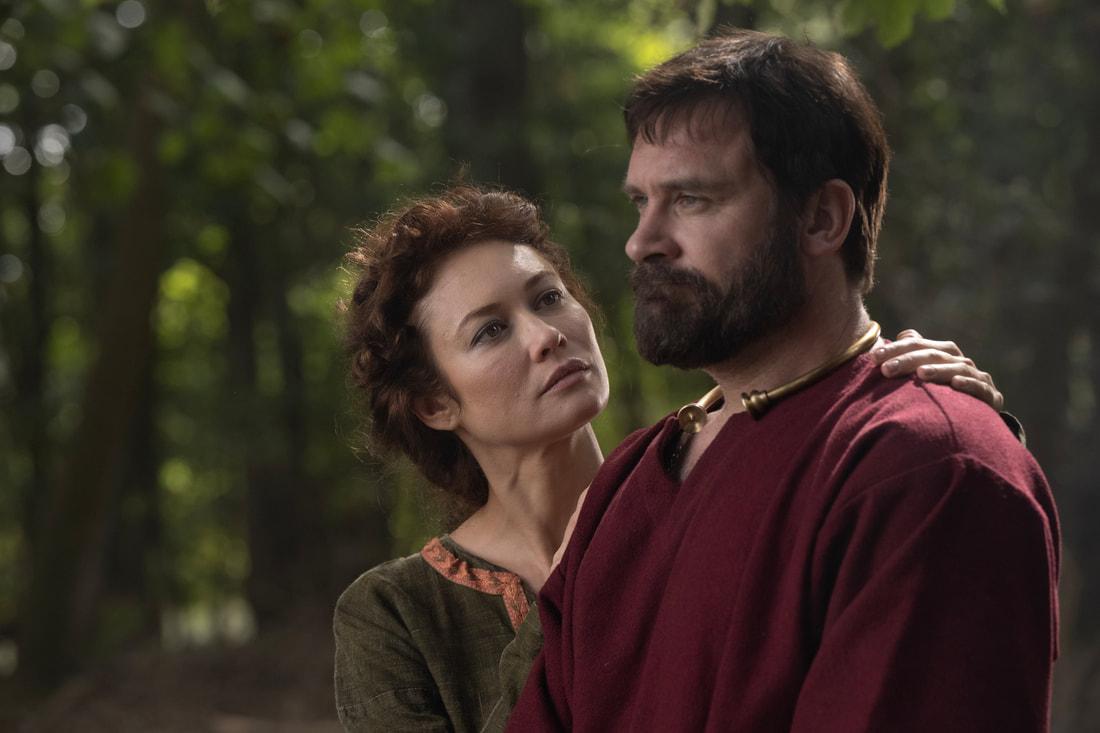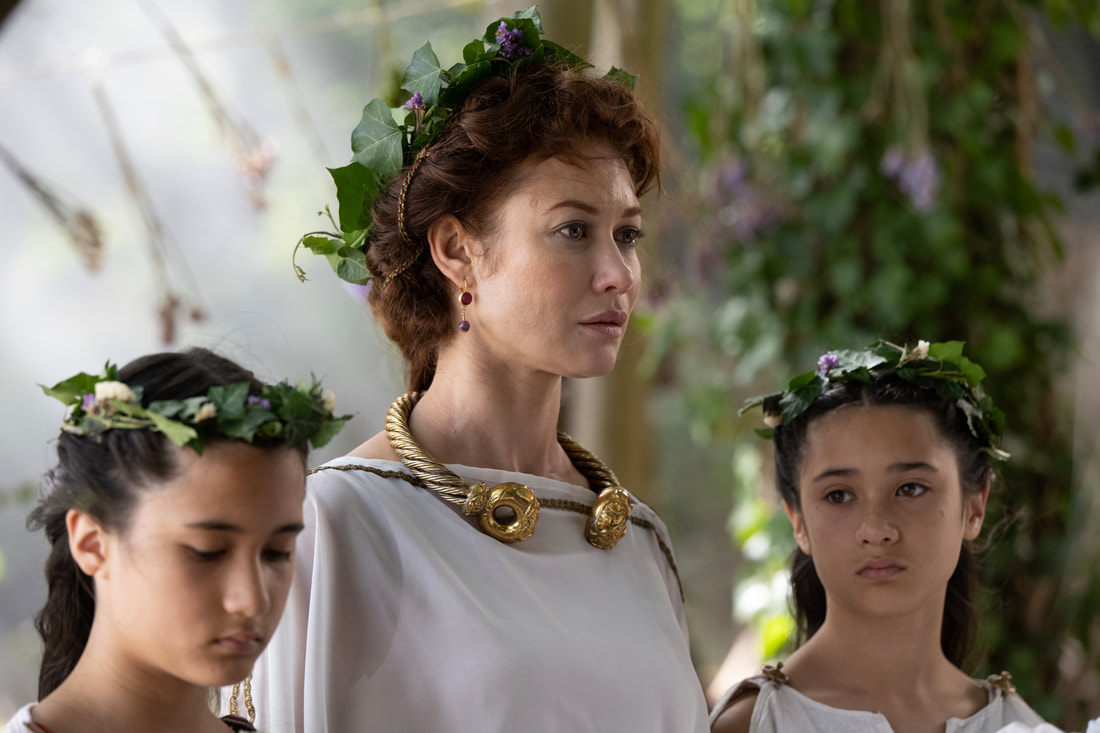|
By Sean Boelman
Tracie Laymon’s feature debut Bob Trevino Likes It was one of the buzziest premieres in this year’s SXSW Narrative Feature Competition, largely thanks to a star-studded cast including Barbie Ferreira (Euphoria), John Leguizamo (Romeo + Juliet), and French Stewart (3rd Rock From the Sun). A semi-autobiographical retelling of the filmmaker’s experiences, the film follows a young woman who, growing disillusioned with her manipulative father, bonds with a man on Facebook who shares his same name. It’s a family dramedy that’s equal parts touching and hilarious but consistently crowd-pleasing in the best possible way.
One of the things that makes Bob Trevino Likes It stand out is that it’s an uplifting story about social media. All too often, movies about social media tend to focus on the negative, emphasizing its dangers. However, in Bob Trevino Likes It, the protagonist (Ferreira) finds a wholesome, heartfelt connection with a stranger on social media (Leguizamo). When asked about the film’s unique perspective on the timely theme of social media, producer Sean Mullin said: “I think this is probably the first great movie about how social media can actually do good. There's not a lot of them, and I hope there are more, but this is actually a positive social media movie, which is really exciting to get out into the world.” However, the aspect of Bob Trevino Likes It that is likely to resonate most with audiences is its exploration of the theme of chosen family. Throughout the movie, Ferreira’s character finds an unexpected father-like figure in Leguizamo’s character. The result will be intensely relatable to many viewers, especially those who have felt cast out or otherized by their family members. Mullin explains: “We can't pick who we’re born to — our biological families; sometimes they're really, really wonderful and lovely, but sometimes, we need to stand up and set boundaries, and we need to hold our own. I think in this time, this day and age, where a lot is up for discussion, what is family? I think this idea of creating your own, regardless of blood, is really important. That's why I think this is really an essential film.” Writer-director Tracie Laymon adds: “A lot of the time, we're born into situations, and we think this is all we get. You just keep trying to bark up the wrong tree or get love from people who may not love you or accept you, and I think that’s a kind of universal thing. So, I think the importance of chosen family is that sometimes you have to let go of the people who continually hurt you to make room for the people who want to love you and are right there. If you stop spending all your time and energy with people who maybe can't do it, there are so many people; there are so many connections to be had.” Bob Trevino Likes It screened at the 2024 SXSW Film Festival, which ran March 8-16 in Austin, TX.
0 Comments
By Sean Boelman
Filmmaker Crystal Moselle is one of the best in the business at making discoveries. First, she gave us The Wolfpack. Then, she gave us the ladies of Skate Kitchen and Betty. Moselle’s latest discovery is Derrick B. Harden, who not only stars in her latest film, The Black Sea, but co-directs it with her.
Having debuted in the Narrative Feature Competition at this year’s SXSW Film Festival, The Black Sea is inspired by Harden’s experiences. It tells the story of an African-American man who is stuck as an outsider in a community in Bulgaria, where he finds an unexpected sense of belonging. It’s a slice-of-life film that’s equal parts funny and poignant, and heralds the arrival of a tremendous new talent on the scene in the form of Harden. We at disappointment media got the chance to speak with Crystal Moselle and Derrick B. Harden, along with producer Izabella Tzenkova, about their latest film. Here’s what they had to say:
disappointment media: Ms. Moselle, you have a knack for finding real people and real stories and telling fictionalized versions of them. What intrigues you about this style of storytelling?
Crystal Moselle: It's the people. And with Derrick, it was so easy because he is naturally a director, and he's so charismatic. We just build the story around the person. I think that that's what we've been doing for years. Isabella and I made Wolfpack and Skate Kitchen together. And Derrick and I went to Bulgaria, and he had an amazing experience. I like collaboration. I don't like just to follow people and chill back. I'm too collaborative. I have too many opinions. Whenever I do a documentary, I'm like, “I really think that if you do this with your business, you'll make more money,” or whatever. I don't like to see people suffer. I want people to thrive. And I think that collaboration is the best way to do that. I think it's a more responsible way to make movies. disappointment: Mr. Harden, this is your first performance, and I think you knocked it out of the park. What made you want to step up in front of the camera? Derrick B. Hardin: The camera was on. I took two steps in front, and then it felt good, and I said, “I could do this.” It's the whole idea of collaboration and creating something meaningful with people who have a heart. Crystal, of course, was the main reason this project was happening. Then, the phone call to Isabella was the glue — Isabella opening up her whole world. And we made a film in 16 days. And here we are, we started shooting in like, August? Izabella Tzenkova: In mid-August we were shooting, yeah. Hardin: I remember the first call between the three of us. It was all new for me, but it was a reunion for them. So they were like, “We’re back, sister!” And it was on my birthday, so I remember that call. I was like, “Crystal, can it wait till tomorrow so I can do my birthday?” and she was like, “No, no, no. Izabella wants to do the call, so we gotta do the call.” And yeah, I’m forever grateful to Izabella for saying yes to a script that doesn’t exist. Moselle: There’s no script because we were shopping a pilot around, and then the strike happened. We just felt we wanted to do this experiment to show that Derrick could perform because we wanted him to play the main part of the pilot that we came up with. So we just came up with this sort of loose idea and learned about it in Bulgaria, like where it would go. Everything was improvised. I had been doing a lot of teaching with this class that I do, so I had been doing a lot of improv classes and was really into it. And Derrick, literally everywhere we go, becomes the kind of unofficial mayor of that place. He always meets everybody and knows everybody. I knew that if we went back to this Bulgarian town, that would happen naturally. And we can shoot this sort of building of togetherness, as Derrick likes to say. He also coined this other really great term. Harden: We're going to introduce you to the greatest term in the last 30 years in cinema. So right now, I'm with Crystal Moselle and Izabella, and these young ladies have given you guys The Wolfpack and Skate Kitchen — great finds, great discoveries, as you said. So they know the doc world. That's how this project started. It started as a doc. And I'm a rapper. I'm a hip-hopper. So, making music, freestyle, and coming up with words from thin air just pulling out words and phrases and things — I think the marriage of those two things and those two worlds created this film because hip hop has a lot to do with improvisation. So we coined the phrase, this film is basically cinematic freestyling. disappointment: That’s amazing. You mentioned how you are a musician. I think the soundtrack is one of my favorite parts of the film. Do you think your background as a musician helped him form your soundtrack choices with this? Harden: 100%. But I think that the reason why people are liking my music is because I'm an underground rapper that no one knows, which is really cool because I'm not ushered in by a record label to help market me in a different frame. I'm really a gem. Somebody's going to really discover something. I'm fine with being underground, local New York. And my life is nice. I'm cool with it. But because nobody knows me, it makes it more special. Tzenkova: The soundtrack, actually, half of the songs are Derrick's songs. Harden: When we were filming it, Izabella said, “Wait… this is your song?!?” Moselle: She thought it was a big pop hit, and we were like, “No, we haven't even released it.” But I think we had no plan for how the music was going to come into the film. When he was on the boat with Giorgi, rapping to him, that was just happening, and we turned the camera on. Something I really love is when you weave in just somebody's world and life and who they are without it being a plot point. The movie wasn’t about a guy trying to be a rapper. Harden: It wasn’t “I gotta blow up when I get to Bulgaria!” Moselle: He was trying to own a coffee shop, not be a rapper, but he just happens to rap. And I think that it was really nice. I'm really proud of the way that we wove it in. Harden: And she really helped put me it in a light where it's not corny or cliche because we know those hip-hop movies — we don't want to name-drop and make people feel bad — but we know those TV shows where the guy raps and then we have other celebs. We know what’s trash. And it's just so seemingly in there that you're not concerned that Khalid raps. It’s just what he does. There’s a word you used… Moselle: Diegetic. Harden: It’s diegetic. Moselle: We wanted all of his songs to come in in a diegetic way. There’s only one that doesn't at the beginning of the movie, but it kind of feels like it could be on the street; the way that we mixed it was to feel like something coming just from the environment. And then also bringing in some of the Bulgarian music, like at the open mic night to get some of the local Bulgarians in there. It was so fun to discover some of the rap and stuff. And they also really love hip-hop there. There's a whole thread of hip hop in Bulgaria, and you can see it with the clothing and with the music, and it was a nice balance, I think. disappointment: You mention balance; I think the film’s tone also strikes a very delicate balance. Although the film deals with some serious themes, it has a very funny sense of humor. Why did this approach stand out to you? Moselle: It’s what happened. Harden: I think it was just the nature of what happened. The history of Bulgaria and the history of African Americans — both stories have a lot of suffering. And when you find suffering, you find humor. One of the things that makes this ultimately very funny is that both people understand how low and bad life can be. There's a bit of, “It's not that bad. It's never that bad.” Moselle: And the film found us. We didn’t plan the film; it came together. We didn't say, “Oh, we want this to be in it, and we want that to be in it.” It was just what felt right. And I think it was important to Izabella — obviously, we went to Bulgaria to be in her community — and I think, the authenticity of shooting a movie in Bulgaria, we just wanted to make sure that we were truthful. Tzenkova: That it wasn’t exploitative. That it was encompassing and involving. Harden: On all sides, too. We didn’t want to have a Black guy named Khalid over there just doing wonky stuff. We wanted to make sure that both sides, Khalid and Bulgaria, are being well represented. Tzenkova: I think it's very common for people to go to a foreign place or culture, and they go in with their cliches, and that's the representation that they end up making. I thought that was something that we very much intentionally wanted to avoid. disappointment: I think something that's really unique about The Black Sea is that, in a lot of films where you have a character who's an “outsider” going into another culture, the other culture is kind of otherized in a way. But in this film, Khalid’s culture is kind of otherized. Do you want to talk about how you flipped these tropes? Harden: In Brooklyn, I'm faced with all those realities for all those New Yorkers. I mean, when you look at the word migrant, you look at the word migrate, that only means a person coming to the United States of America, but then when someone from the United States of America leaves to go live in the Philippines, they're an expat. I’m a migrant over there. Moselle: It’s an exchange. Cultural exchange is a phrase that we use a lot because we wanted to show the similarities and learn things. When we first were making the film, when it was more of an experiment, we were throwing around Borat, but like actual respect for the cultures. But then it became less of a Borat-y type of film and it really surprised us what the film turned into. We thought it was gonna be like this fun thing, but it actually got pretty tender. Tzenkova: I think it also came naturally because the Bulgarians were naturally curious. And that's probably where the turnaround of that experience comes from. Harden: Yeah, the genuine curiosity. Moselle: Again, it wasn't a plan we had. This happens to me a lot. As long as you represent the people and have respect for everybody, it just happens naturally. If you’re a respectful person and you’re not trying to exploit somebody, it’s just gonna show through. disappointment: You mentioned how tender the film is. One of the themes in the film that really resonates is connection. This is a film about connecting with other people on unexpected common ground. Why do you think that this theme resonates so much? Tzenkova: Because we need it more than anything in the world right now. Harden: Common ground is what we need. Common ground brings togetherness. That common ground that we both didn’t know what was going on. Ina’s character and Khalid didn’t know what was going on. That was the common ground they stood on, and then they built something. Moselle: Yeah, and it’s leaving your misconceptions of things and connecting with people rather than, “Oh, they voted for this person; they voted for that person. I can't be friends with them.” We don’t believe in that. In our work, like with Derrick, we use the word togetherness. We believe that is the answer. We want this film to actually inspire that and for people to look at the world a little differently at that moment. People have come up to us like, “This is exactly what I needed right now.” And that, to me, is a beautiful thing. disappointment: Yeah, absolutely. I think it's a really wonderful film in that way. It captures the feeling of community very well, and a lot of the reason why it does that is because a lot of the people in that community, from what I understand, don't have an acting background. You're using the real people from there. So, can you talk about the challenges and the rewards of taking that approach to working with non-actors? Moselle: I think the challenges are like people committing to a schedule. Tzenkova: Which was loose anyways. Moselle: Yeah, we’d be changing everything. Harden: We’d ask them to come at 4, and it would be 5. Moselle: And then they wouldn't come at all. But also that gave us an unexpected creative spark. Then you're like, “Oh, who can we call? Let's call those girls back in!” Listen, filmmaking, in general, is challenging. There are so many levels of it that you have to bring together. And it’s hard. But I think that we trusted the process. It’s all easy, it’s all hard, and the magic just comes through when you just keep going with it. I think there is no other way to do this movie than to grab people off the street in the moment because that’s when we got the best moments. disappointment: As far as the improvisation goes, the runtime was just over 90 minutes. Did you end up capturing a lot more footage than that? Moselle: No… Tzenkova: We wish we would have captured a little bit more! Moselle: But I was so surprised. I thought, “Oh my God, there's probably some crazy holes in the story that we're gonna have to fill,” and there really wasn’t. Harden: No, there wasn’t. At all. Moselle: It was wild; we actually just kind of did what we needed to. Tzenkova: When we first started talking about it, too, I think we were trying to be a lot more realistic, as optimistic as we ended up being. But we thought we were going to shoot a short film, a proof of concept, and then come back the next summer and develop it and then do a feature. And then the closer it got to it, we're like, “No, actually, we can probably push this out. We can push out a feature film.” Moselle: And we did! We knew that Khalid had to bring this town together, and that happened eventually, and we created the obstacles for him to get there. It was really fun. It was the best shoot I’ve ever worked on. I love working like this; it’s the best. There wasn’t this pressure that you can get from money people. You’re spending your own money and only getting paid for yourself. disappointment: And Mr. Harden, have you been bitten by the film bug? Are you looking to do more in this sphere? Harden: I definitely have gotten bitten by the film bug. You will see me at the same time next year with a different film. Moselle: I wish that was a joke. We have a Black Sea 2 idea. Everywhere we go, Derrick has a spark for ideas. And I’m not even kidding you — we probably have about 25 ideas that are all fantastic.
The Black Sea screened at the 2024 SXSW Film Festival, which runs March 8-16 in Austin, TX. It is currently seeking distribution.
By Sean Boelman
American Symphony is a new documentary following musician Jon Batiste and his wife, writer Suleika Jaouad. Although the film might have started with the intention of following Batiste as he composed his latest work, its focus shifts when Jaouad learns her cancer has come out of remission. The result is a wonderfully emotional documentary in many unexpected ways.
In a recent press conference, Batiste, Jaouad, and director Matthew Heineman (Cartel Land, The First Wave) discuss their artistic process and some of the key takeaways they hope audiences have from the film. Part of what makes American Symphony stand out from the mass of other music documentaries is that Heineman gets such an incredibly personal glimpse into the lives of his subjects. While Batiste and Jaouad are both acclaimed artists, and the film is about Batiste composing one of his most ambitious and audacious works yet, their creative processes are intertwined with their lives. Batiste had this to say about how his work reflects the experiences he has had in his life: “We were talking a lot about synthesis and the creative process when I’m with the musicians, and I’m talking about how to synthesize all these things and to create a new sound, a new approach, really my own approach. I think about life in that way. And in this time, you can’t be in the present without having some form of integrative synthesizing thought. You’re bringing it all together. You’re using this in that and that in this. That’s inspiring this piece, and this piece is inspiring how you show up for your wife. And this is inspiring the Grammy’s performance. And that all becomes one. To me, that was what happened in this moment, and that’s typically what I’m doing anyway, but it was on hyper-drive in this seven-month period. How do I take everything that’s happening and integrate it all into one? Because that’s the only way I’m gonna be able to be present in all of it effectively and move forward and keep the momentum going.”
Indeed, one of the most moving things Batiste says in the film is “music comes from life experiences.” When asked if he thought this wisdom rings true in other mediums of art, including film, this is what Heineman had to say:
“I hope, if there's nothing else that comes out of this movie, it’s that life imitates art imitates life. It's inseparable, especially with Jon and Suleika. They feed each other, both as a couple in their lives and their music. I think one of the moments in the film that really personifies that is when John dedicates the songs to Suleika, and he pauses for 90-100 seconds or so. And in that moment, he writes a novella for us about what he's feeling. The way he puts his left hand and then the right hand, and obviously, there's so much weight that he's carrying with him. He’s obviously worried about Suleika and trying to sort of transfer that from wherever he’s channeling his energy into his hands and into that moment. So I think that really highlights the duality that exists between their experiences and their music.” American Symphony is now streaming on Netflix.
By Sean Boelman
The Holdovers is the latest film from filmmaker Alexander Payne (Sideways, The Descendants), and stars Paul Giamatti as a boarding school teacher who gets stuck over the winter holidays with one of his dejected students (Dominic Sessa) and the school’s cook (Da’Vine Joy Randolph)
One of the biggest highlights of the film was the chemistry between the three leads. In a press conference with the trio and director Alexander Payne, they were asked how they worked to build this chemistry on set. This is what Giamatti had to say: “We had time. You always make time. I mean, when I’ve worked with [Payne] before, [he] make[s] time. So, we had a couple weeks to sorta get to know each other. I remember that specifically on Sideways, we had more time probably. But any time is more than you usually get.” Randolph adds, “For this project, let’s say we had three weeks in which we were doing table reads and text analysis and working stuff out. Because people have been asking this question about what was improvised and what wasn’t. I think that was very unique, to me at least, that Alexander did, was that there was room for that, but we did it at the early phase of the table read session. So then it was kinda like this is our collective, agreed upon script, and that we stuck to. But the fact that we had that time to do that, I haven’t had that in a very, very long time.” “It was this little group of the three of us. It felt like a little chamber play thing sometimes,” Giamatti concludes.
However, even more impressive is that Sessa, who has never had a screen credit prior to The Holdovers — even in short films — is able to hold his own against the two more experienced performers.
This is what he had to say about the prospect of working on Payne’s latest film with his acclaimed co-stars: “I mean, yeah. I just didn’t know what these people were gonna be like to me beforehand. These are celebrities to me, you know? So, I don’t know if they go back to their trailers and plug themselves back in or whatever.” He adds, “I genuinely could not have asked for better people to do this with for the first time around. Everyone was so down to earth, grounded, and confident in what they were bringing, but also confident in what I was able to bring, too. Like, you guys really, genuinely trusted me in my creative process, my artistry, and that’s all I really could’ve asked for the first time.” If his performance in The Holdovers is any indication, we can look forward to seeing even more great things in the future from Sessa. The Holdovers hits VOD on November 28. Legendary Action Filmmaker Jesse V. Johnson Talks His Historical Epic BOUDICA: QUEEN OF WAR10/27/2023 Interview by Daniel Lima In another era of filmmaking, Jesse V. Johnson would be a studio stalwart — an auteur at the helm of a deluge of two-fisted tales about individuals who lead lives of violence. Even without the support of major studios, he has maintained a decades-long career in the action and crime genres, with films like Avengement and the Debt Collector series cementing him as one of the most exciting directors working today. His latest effort, Boudica: Queen of War, relays the story of a Celtic warrior queen who fought against the Roman occupation of Britain millennia ago. We at disappointment media had the privilege of talking to Johnson about the film, delving into his personal motivation to bring the legend to screen, the importance of grounding a figure like Boudica in reality, and developing the visual aesthetic. On Finding Humanity in Legenddisappointment media: When you first wanted to write this story, were you attracted to exploring and relaying the legend of Boudica? Or were you more interested in delving into the psychology of the woman who experienced what she did? Jesse V. Johnson: It was the woman that interested me. My mother took me to the statue [of Boudica in Westminster] as a little boy, and she would have been a divorced single mother, a very fiery redhead. This was a legend she was obsessed with from her school days. It represented a powerful woman who got what she wanted and protected her children with everything she could, which I think is how my mother saw herself at that particular point in time. As a child, you feed off your parents, and this feeling of importance to her laid the foundation in me quite young. As I grew older, I researched her life and her story, and it just fascinated me. I don't know if it was because of my mother, or because of my own imagination, or what I saw in that story. But what I find interesting is that a normal person, the everyday person, the person who we are familiar with, we may live next door to do, having to find something within their soul to deal with the problem that's presented to them. In my mind, she’s a well kept housewife and a wonderful mother worrying about the sort of things that a housewife and a mother worries about, and there wouldn't have been much reason for her to worry about things beyond that. They were in a very comfortable situation, collaborating for quite some time with the Roman occupation forces. They would have had everything they wanted, food and land and servants, it would have been quite a good lifestyle. Then this act happens, this terrible, terrible act. We're not sure what really caused it — I've invented my version of events — but we then have the second life for this character, where she becomes something else altogether. Completely motivated, but reaches deep within her soul and forces this other person, whether by people's expectations to where she is or particular timing of what's going on, to become this warrior, a million miles away from where she started. I find that stimulating and powerful, and whether it's a man or a woman, this is dramatic for me, and it was something that obsessed me, and I wanted to make the movie in quite some time. It just presented dramatic problems that took me a long time to figure out. On Historical Fidelitydisappointment: You mentioned having to invent what was there, because so much of her story was lost to history. When you were filling in those details, for you what was most important to emphasize about her character? Johnson: I wanted her to be believable and organic, to feel like someone you knew: layered, textured, fickle. She has a fascination with cooking, with trying to better herself in the arts. She wants to be fashionable, she wants to make sure her children are well kept, and educated, ready to take over when she and her husband become older. It's remarkably similar to how we feel about our children now. I didn’t want these to be cut out of a history book, like a living history. I wanted them to be as palatable and acceptable as if we were watching people from the 21st century, because to embed her in that familiarity in the first act would make the second act more profound. My biggest concern was making it feel like a world that they lived in — that they walked from A to B for a reason, that they were eating at that particular time of day for reason, that he loved her for a reason, that they were king and queen for a reason. If I could make that feel believable, the second half was going to be feel believable too. The Iceni kept no written records. They had drawings and swirls and beautiful carvings, but there's no writing. The only history we have from their time is from [the Roman historian] Tacitus, and he lived quite a few decades after this event happened. But the more you scratched the surface, the more different historical records you read of the time, the more you see elements that would recur. You try to find your way through all the flourish, find the raw bones, and that's what we've built on. The museum in Colchester was wonderful. Colchester was the first city that she burned when she went on her initial rampage. It was a temple to Claudius that she burned to the ground, full of Romans that were living there at the time. There's a layer of black in the dirt when you cut down, where the sand and cement was turned to glass from the superheating inferno. It's really dramatic stuff, she was ruthless, utterly ruthless. And compared to the first apparition that we meet of her, I think that's a fascinating sort of journey for a character to go on, and this transfixed me for decades. On Handling the Story’s Darknessdisappointment: You noted the first half came easier to you when you first sat down to write the script years ago, and that the second half was kind of a puzzle before Olga came onto the project. What was exactly the problem that you couldn't square when you first sat down to write the script? And how did Olga solve that? Johnson: Well, I wrote the first half of the script. I had no problem with that, I understood her. What I couldn't work out with this act of indescribable evil, which happens midway through, and both of the Roman accounts describe this in detail. There's no way you can film it, people don't want to go to the movies for that. Every single version of Boudica — whether it's written, whether it's filmed, whether it was a stage play — has ruined itself by not handling that correctly. If I showed anything close to that, it would be insulting. If I withdrew and said, “No, this didn't happen,” it would also be insulting. I felt a great responsibility to treat her with respect, her story with respect, and never had quite that feeling before. It became a heavy burden on my shoulders, and I hope it shows in the movie. Meeting Olga, I realized I had this friend now who I love working with. I adore the way she works, I love the way she looks on the camera. The way she approaches her work inspires me. I could make every film with Olga for the rest of my career. If she agreed to it, I’d have no problem making Olga Kurylenko movies, and then retiring Joseph von Sternberg style after Marlene Dietrich. I'd met her, and I knew I could get the film made. Then I dragged out the script. I had got thirty-five pages, then stopped. I attempted fifteen or twenty times to get through that act, working out how to do it. It was through reinvigorated interest in getting it finished that I just happened across a description of these Vietnamese mothers during the Vietnam War, who had seen so much evil, been privy to circumstances that were so incomprehensible to us, that they had gone blind through a psychosomatic condition. The doctors could find nothing wrong, but they were blind. It happened on quite a large scale, and it was simply a human reaction to seem too much. I realized that therein lies the answer to my issue. For me, it was the most befitting way to show that in film. You let the audience realize at the same speed that your character realizes that they're lost, and they've gone, but you don't show it. You realize that it's such horror that she's seen that she's just wiped it out and replaced it with the imaginary. On the Film’s Visual Aestheticdisappointment: You're operating in a milieu that you haven't before, historical drama, far away from the inspirations you've cited previously for previous films. In building the visual language of Britannia, what were your inspirations? How did you choose to capture it? Johnson: We chose to focus on Pre-Raphaelite paintings, neoclassical paintings of the English romanticism era. They used the light extraordinarily well. Everything was quite wide, what we call a “cowboy shot,” where you see below the feet and above the head, and use backlighting as much as possible. We looked at the Caravaggio's as well, a lot of chiaroscuro-style lighting is taken from paintings. We just put books and books and stuff together from that era, and looked to the classicists from that time. We didn't want to make it a raw, handheld movie, as far away as possible. Try to be invisible with the camera, make these tableaux as attractive as possible. Color-wise, it's very lush, everything's alive at the beginning of the film. Flowers, everything is a rich green, you just grab a handful and eat it like salad. After the event, we make it brown and darker, a little less lived-in. Towards the very end of the film, where everything seems to be brown, black or gray, a more dead feeling to nature than the lush of spring — which is sort of how it happened anyways, because it was wintertime when we were finishing up. We sucked out a lot of the green and replaced it with autumnal colors, small things just to subdue it a little bit. We all associate lush green with life and springtime, and vitality and vibrancy. As you dispense with that, it feels like a transition. Boudica: Queen of War is now in theaters and VOD.
|
Archives
March 2024
Authors
All
|
|
|
disappointment media
Dedicated to unique and diverse perspectives on cinema! |

